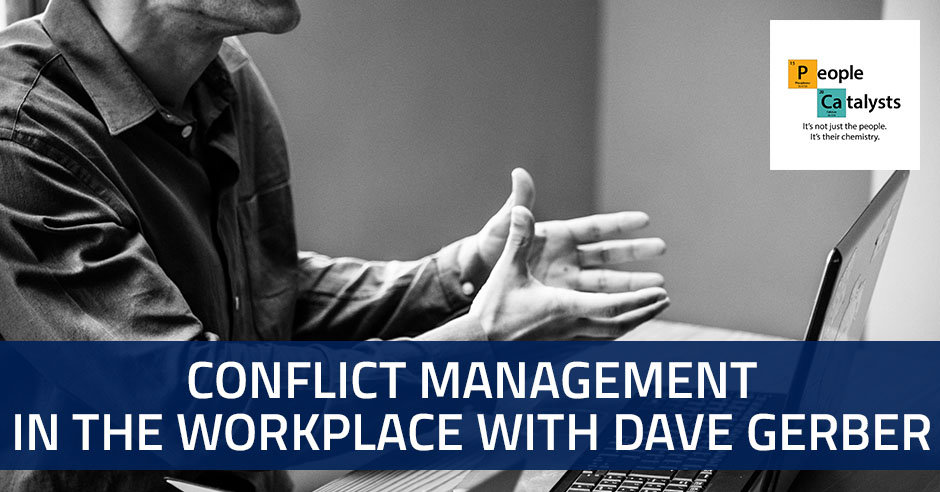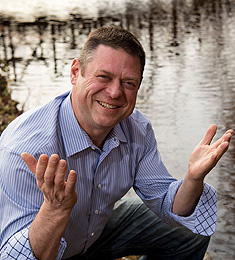Conflict Management In The Workplace with Dave Gerber

Sometimes it’s just the small things that impact major parts of relationships. Conflict Healer Dave Gerber’s work is around connecting with progressive leaders that want to solve obstacles, people problems and need solutions such as leadership coaching, dynamic training, effective facilitation, mediation and more. Dave and his company will help you grow high performance teams throughout the organization and improve the way people treat one another in the workplace while increasing revenue. Dave will help to give your people the skills to prevent, manage or resolve conflicts while finding deliberate ways to improve culture with conflict solutions that are easy and make sense to implement right away. Listen on to learn more about conflict management from Dave.
Listen to the podcast here:
Conflict Management In The Workplace with Dave Gerber
Welcome to the People Catalysts Podcast, Dave Gerber.
How are you?
I’m doing great. Calling in all the way from Virginia?
Absolutely. I’m outside of the nation’s capital.
That’s a busy place. Dave, we’re so excited that you could share some time here with us in The People Catalysts. The People Catalysts breaks down into three different areas: The relationship with your team, the relationship with your clients and then your relationship with your promoter. Some people call them channel partners depending on what vertical you work in. What’s interesting about what you do, Dave, is it can apply to all of those things because it’s at the root relationships. Your title, The Conflict Healer, can you tell us exactly what that means and what your specialty is in reducing conflict in regards to your team, client or promoter?
Conflict Healer was a name that we try to use for a little bit of different branding to help reach out to companies and organizations around keynote speaking. When it comes to addressing larger groups, that’s a moniker that I’ve used because I’m trying to blend a combination of things. One is leadership best practices that go across the industry. The second is I have a specific background in conflict but also have a background in self-defense. I’m a black-belt instructor level in self-defense.
I saw that Krav Maga. Not many people know what that is, but I’ve attended for quite some time and it is one of the hardest workouts I’ve ever done in my life.
It’s pretty good stuff. We had the warrior side of leadership there and also, I have an advanced certificate working towards my master in Reiki energy healing. I want to be able to do the deep dive into conflict. I want to be able to connect with people of all different backgrounds, and help leaders create solutions for companies and organizations that bridge some of the gaps that are pretty big yet can be filled pretty easily.
Sometimes it’s just the small things that impact major parts of relationships. There was something I saw on one of your videos that is absolutely one of my biggest pet peeves in regards to any relationship. This could be with your spouse.This could be with your team leader.This could be with whoever you’re directly working under or even your clients, anyone as far as relationships.Two words that you absolutely should work on avoiding is why and but. Could you share with us why that is?
Conflict Management: Small changes go a long way.
The reality of it is small changes go a long way. One of the things that I’ve talked to people about particularly in collaboration, communication and conflict management is some of these things that we do seem meaningless or harmless actually are big and have an impact. If we change them, and it takes some time, we automatically are seen as a more collaborative person. People don’t even know why particularly around these two little dirty words. The first one is why. When you say, “Why?” or you ask them, “Why did you do that?” you’re basically backing them into a corner. If we think about a skunk, what happens when you back a skunk into a corner? You get sprayed. If you back a human into a corner, you’re basically asking them to defend themselves instead of explaining themselves. When it comes to building relationships, trust, loyalty with one another and good communication, we want to move away from putting people in a place where their answer is going to feel like it’s judged. That’s what we do when we set people up with the word why as a part of our question. We need to get to the why but we can do that through the who, what, where, when, how. It takes a little bit more effort but conflict management communication and doing it well does take effort.
The second one is but.But is one of those words that effectively negates everything that was said before the person used the word but. I once did a training class and somebody said, “Can you say however?” Another person said, “No, that’s a soft but,” and someone else said, “That’s a different training class altogether.” It’s one of those words that we most often say louder in a sentence and we don’t even realize we’re saying it. If we can use and substitute that with an and, it’s miraculous. Even better, put a period and start a new sentence. It doesn’t need to be a negator. It’s one of those things that often is like shooting yourself in the foot. You don’t mean to do it, you don’t even know you’re doing it until it hits, and then all of a sudden it’s too late.
I’ve been trying to train myself on that for a very long time. When I say it, I just go back. It’s amazing how many times, not even intentionally, you’re wanting to communicate but we only have our own perspective. It is a skill to be able to listen without trying to have anything to say back and then thinking before you then respond. It takes a little longer but the outcome is a lot better.
Particularly in the corporate world as people are growing and leading, we’re trained to listen to respond. When we want to be effective, we have to listen to understand. It’s that, “First, I have to show them that I care before I show them what I know.”
When we want to be effective, we have to listen to understand. Share on XIt’s so critical, especially to what you’re saying about leadership. Leadership is an outcome of those things. Sometimes we try to think we can just be leaders. Actually, there are certain skills that then have you be an effective leader. It’s human nature sometimes to respond in that regard. It’s just from your perspective. A lot of times in The People Catalysts, we have a specific training based off the Law of Diffusion of Innovations. One particular individual who we call the prover has a great skill. They feel it’s their need to warn you about what’s going to go wrong. Sometimes your greatest strength that makes you great at being an engineer makes it a little bit more challenging when you shift gears.
Elias Porter said that essentially, our weaknesses are really overdone strengths. That would fit right with what you’re saying. The person who shows up as gullible is really a trusting person. They’ve just overdone their strengths. If somebody is assertive and they overdo it, it shows up as aggressive. We have to step back. Someone once said, “We judge ourselves by our intentions and we judge other people by their behavior.”
That’s a good one. There are not many quotes that I haven’t heard over the years. That’s fantastic.
It’s like, “You hurt my feelings.” “I didn’t mean to.” “You did.” “I didn’t mean to,” and we want to be let off the hook because we didn’t mean to.If it’s in the other way around, it’s like, “Did you see the way they just cut that person off at the meeting?” That’s the behavior that we focus on and it’s just a reaction, a primitive thing. If we can create some space and have better responses instead of reactions, we’re going to be able to build in that shock jock delay. Within five seconds, we can hear ourselves before we say it and think.
When our ears stopped working and we’re worried about talking more than we’re worried about listening.
People think that this stuff is soft but this is the stuff that gets people to want to listen to the hard stuff. When we look at stuff like trust and we break down trust into categories like credibility, dependability, sincerity and care, the last one is probably respect.We often don’t think about how that actual language and the things that we say is contributing to this currency of trust.
I believe that for sure. 93% of what you say is not even coming out of your mouth. There is some authenticity that happens in your wording and your inflection. There was a good friend of mine who ran an emergency room insurance agency. Basically, they insured the doctors if they were to make some type of a malpractice. ER is a really big deal. We’re talking about seconds in decision-making and whatnot. They found out that 70% of people would never do a malpractice suit if the doctors had a good bedside manner. All of a sudden you go, you wouldn’t think that was as important in a medical situation but yet being liked, and it can be respected and liked, it doesn’t have to be one or the other, was the most impactful thing they could train those ER doctors on to make sure that they didn’t get medical malpractice suits.

Conflict Management: 80% of us, our number one fear isn’t dogs, blood, flying, or needles.It’s the fear of being judged.
I was a physician. I come from a line of doctors, which is probably why I didn’t do it. It’s across the board. It’s not even just ER doctors. People want you to be hopeful. They want you to be positive. They’re looking for someone to listen. 80% of us, our number one fear isn’t dogs, blood, fire, needles, it’s the fear of being judged. When you add that with the amount of negative self-talk, to find people, whether they’re leaders or doctors or whomever, who are willing to give us the space to be heard, that’s so huge. We did this exercise in my coaching training where one person had to literally say and do nothing and the other person had to talk about an organizational or a professional problem they were going through. At the end of the ten minutes, the instructor said, “How many people who were talking felt like your partner was helpful?” 90% of the hands went up.
All they did was listen. They just felt better because somebody cared enough to give them the space.
So much of it was not verbal. It’s all the other stuff, the body language, that’s 58% or something like that.
You were touching on this other space that we definitely have been hearing more about in maybe as much as ten years but a lot more in the last five years. I’ve seen a lot of trainers and recruiters coming out in this regard as well, the concept of EQ versus IQ. Can you share with us a little bit about your experience in that regard and maybe some tips to focus on? It’s just the quote you said, “People don’t care how much you know until they know how much you care.”
First off, what’s important is that when we look at EQ, we don’t dismiss IQ in the fact that IQ is important for us to recognize patterns and other things. We use our IQ in some ways to kick in our EQ, which works together as well. Emotional quotient is made popular or famous by Daniel Goleman and he’s done a lot of work on that. The research shows that it’s how people are showing up to work, how they’re collaborating, how they’re knowing when to move away or went to move to people, providing adequate balances of accountability and support, and doing these other “X factor” types of things that are around the human or the holistic side as opposed to just showing up to meetings and being smart. Essentially that was good enough. As I talk to people now about preparing for robots, one of the things I say is, it’s emotional intelligence and your creative problem solving and ability to work together that’s going to keep people in their jobs. When you look at such a huge turnover, that’s going to happen. The best thing that we can do to separate ourselves from machines is that human side. It has such a huge long-term payoff.
The best thing that we can do to separate ourselves from machines is that human side. Share on XIt makes life and business fun, that’s the best part. Everybody enjoys the person that makes everyone feel appreciated and feel that they’re dependable and they do what they say they’re going to do and they’re respectful towards everyone. Everybody enjoys that type of a person. It’s interesting because a lot of people think that it’s 100% natural. There’s actually training involved because we’re just people. There might be individuals that are better at it and some that have to work a little bit more in that regard. However, it’s a critical skill. I love how you say that because we’ve done a lot of training with companies that are utilizing AI and blockchain and all of these different technologies that everyone’s scared about them taking their job. That’s exactly what the research shows, is that all jobs are not going to go away but there’s going to be a lot of redistribution when they start utilizing machines and machine learning, and it becomes something more prevalent. Right now, it’s only the big guys who are using it. It hasn’t trickled all the way down if you don’t talk about things like Siri or things like that that smaller businesses can utilize.
One of my favorite questions that I always love to ask, especially those that are highly relational and focused because on The People Catalysts, our motto is in business and life, relationships are everything. One of my mentors, when I first got started out in business, always said to me, and it made me dream about relationships and how close you could be to the next major person who would impact your life. He would always say to me, “Karla, you’re only one relationship away from dramatically changing your life.” Can you share with our audience about a specific relationship that either you’ve reached out to develop or somebody that helped you that was a significant impact to your life?
First off, I’m still looking for that next person I’m going to meet to take me to the next level, which I think we all are. I was fortunate to have a bunch of people in my life that have showed up at the right time to support me in a way that fundamentally changed my life in some way for the better. I’ve surrounded myself mostly with people who are not afraid to tell me how they feel and tell me the truth, because I think truth is more important than emotions. It’s how you say it, as we know. I don’t want yes people around me. I’ve been fortunate to have several of those people around me and people who were very successful in their own right. I’ve found, for me, I’ve been successful working with people who are about ten to twelve years older than me, maybe seven to twelve years older than me. I feel like they have a lot to provide back that I can then give to other people.
I have a good friend of mine who has done a lot of high-level leadership work and is an introspective person. Because we’re close friends, we can talk quite often. I spent a fair amount of time, several hours a week, in reflection time over stuff that’s going on. That helps me to level up faster. I’m finding that for me that’s the rich stuff in life. I’m not big on TV. I’d much rather write or listen or work with people who can help me further this stuff to help more people. I’ve been fortunate to have a couple of those specific relationships with people.

Conflict Management: Truth is more important than emotions.
There are a lot more out there. The reason I love asking that question is because the answer is everybody have somebody who helped them. You always want to make sure that you’re reaching up, if you’re the smartest one in the room, you’re in the wrong room, but then also reaching down because somebody else picked us up and pulled us. I liked how you said having somebody ten to twelve years older. There’s something to be said about experience. It’s the best teacher ever.
What I realized recently is that they’re at a place of less competition, so they’re more likely to provide feedback and encouragement in a way that lets you know you’re on the right path doing the right stuff. You don’t hear that very often in life.Particularly as a small business owner,it’s nice to hear that. Also, someone who can say, “Maybe you want to think about going in a different direction,” and you know that they have the wisdom and the experience to support where they’re coming from. I’m a firm believer, as I know you probably are too, that we can learn things from people of any age. I wrote a couple of books with my daughter. There are kids that are even younger. You look and you watch these phenoms who are six or whatever. For me, I’ve always gravitated towards people who are a little bit older than me. It’s because I want to learn.
I’ve unintentionally done the same thing. Dave, where can our listeners get a hold of you, whether it’s a website address? I know you’ve got LinkedIn.
LinkedIn is a great place for people to connect with me. They can email me at Gerber@SynergyDT.com. DaveGerber.com or DaveGerber.info are good places to check out. My company is Synergy Development and Training, so SynergyDT.com. If they want books, they can look on Amazon.
Dave, thank you so much for your time. It was absolutely fantastic.
This was great. Thank you so much for having me on.
Links mentioned:
- Dave Gerber
- Daniel Goleman
- LinkedIn – Dave Gerber’s LinkedIn
- Gerber@SynergyDT.com
- DaveGerber.com
- DaveGerber.info
- SynergyDT.com
- Amazon – Dave Gerber books on Amazon
- https://twitter.com/conflicthealer – Dave Gerber’s Twitter
About Dave Gerber
 Dave Gerber, President and Founder of Synergy Development and Training, LLC is a change catalyst, motivating people to become the best version of themselves. He helps organizations grow relationships and revenue by supporting leaders to use conflict as a part of heightened solutions.
Dave Gerber, President and Founder of Synergy Development and Training, LLC is a change catalyst, motivating people to become the best version of themselves. He helps organizations grow relationships and revenue by supporting leaders to use conflict as a part of heightened solutions.
When keynoting speaking Dave inspires his audiences to transform the way they engage with the world around them. His dynamic, humorous style and remarkable depth and breadth of content has earned him the reputation of “best speaker ever” by many of his audiences. His talent for simplifying complex ideas into elegant solutions is a gift that leaves participants with actionable learning that they can implement immediately.
A passionate “teacher, healer, warrior and poet”…Dave Gerber is more than a dynamic speaker. He is also an Executive and Leadership Coach, Learning Expert, Master Trainer and Author. Dave has presented to more than 10,000 executives, managers and individuals from across the U.S. Some of his audiences include: SAIC, NASA, Dominion Power, Novo Nordisk, Military & Intelligence Community, Medical & Dental Community, Martial Arts Community, ManTech International, NTCA, EPA, ATPCO, National League of Cities, Project Management Institute and PA House of Representatives.
Dave Gerber has a proven track record converting his personal experience into conflict lessons that have been shared with employees of all kinds, at every level, in a coaching, training, speaking and consulting capacity. Dave is also the only speaker in the world that uses innovative, rarely seen, moving sand art! Audiences will love the experience and connection to the theme of the keynote or event. Most agree within the first three minutes that having Dave speak at their event was a great decision!
In addition to his organizational leadership and conflict management experience, Dave is a certified, Instructor-Level Black Belt in Krav Maga (self-defense), and has completed his Advanced Certification training in the art of Reiki, Japanese Energy Healing.
Dave is also a prolific author. A selection of his titles include:
Use Conflict: Advance Your Winning Life
Are You a King or Queen of Conflict…In Project Management?
Roadmap to Success (with Deepak Chopra and Ken Blanchard)
On Fire Leadership® (other motivational quote books for martial artists and the military)
L.I.F.E. Line Self-Defense® (Book Series for Kids and Women)
